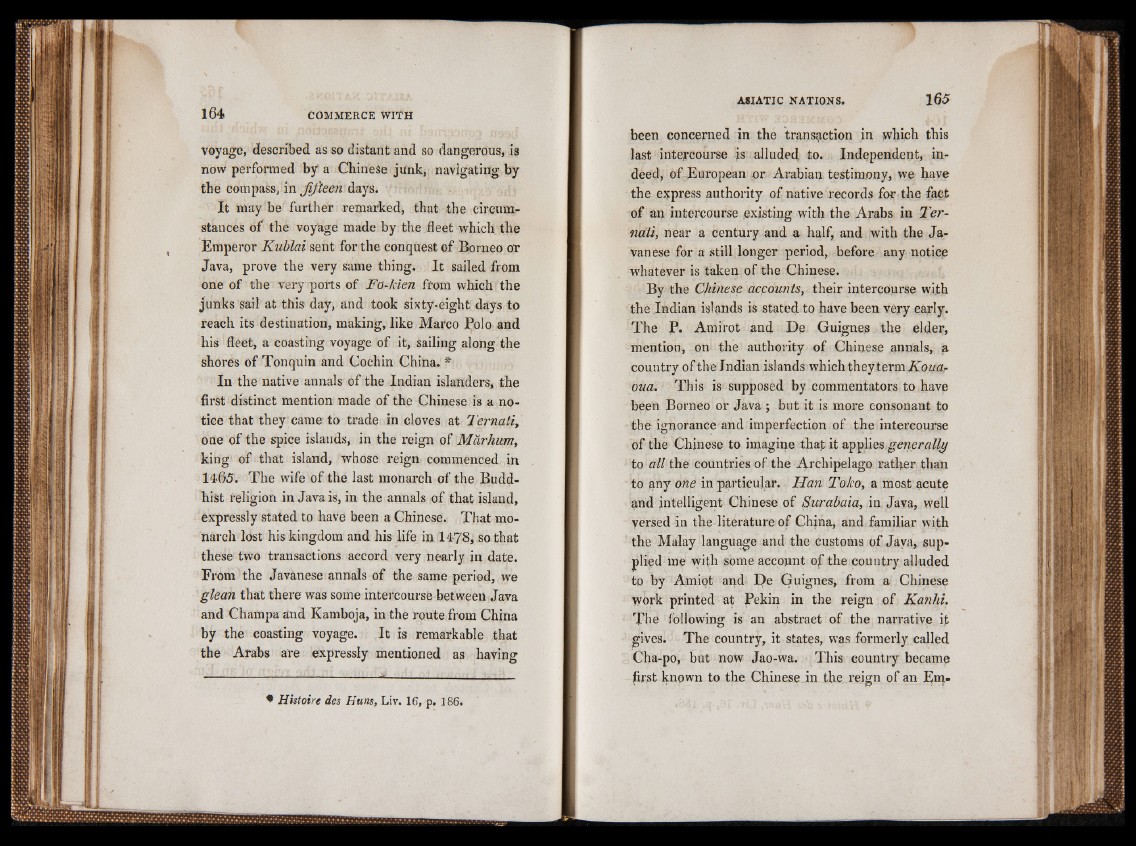
voyage, described as so distant and so dangerous, is
now performed by a Chinese jiink, navigating by
the compass, in fifteen days.
It niay be further remarked, that the circumstances
of the voyage made by the fleet which the
Emperor Kublai sent for the conquest of Borneo or
Java, prove the very same thing. It sailed from
one of the very ports of Fo-kien from which the
junks sail at this day, and took sixty-eight days to
reach its destination, making, like Marco Polo and
his fleet, a coasting voyage of it, sailing along the
shores of Tonquin and Cochin China. *
In the native annals of the Indian islanders, the
first distinct mention made of the Chinese is a notice
that they came to trade in cloves at Ternati,
one of the spice islands, in the reign of Marhum,
king of that island, whose reign commenced in
1465. The wife of the last monarch of the Buddhist
religion in Java is, in the annals of that island,
expressly stated to have been a Chinese. That monarch
lost his kingdom and his life in 1478, so that
these two transactions accord very nearly in date.
Erom the Javanese annals of the same period, we
glean that there was some intercourse between Java
and Champa and Kamboja, in the route from China
by the coasting voyage. It is remarkable that
the Arabs are expressly mentioned as having
♦ Histoire des Huns, Liv. 16, p. 186*
been concerned in the transaction in which this
last intercourse ¿s allude^ to. Independent, indeed,
of European or Arabian testimony, we have
the express authority of native records for the fact
of an intercourse existing with the Arabs in Ter-
nali, near a century and a half, and with the Javanese
for a still longer period, before any notice
whatever is taken of the Chinese.
By the Chinese accounts, their intercourse with
the Indian islands is stated to have been very early.
The P. Amirot and De Guignes the elder,
mention, on the authority of Chinese annals, a
country of the Indian islands which they term Kouar
oua. This is supposed by commentators to have
be,en Borneo or Java ; but it is more consonant to
the ignorance and imperfection of the intercourse
of the Chinese to imagine that it applies generally
to all the countries of the Archipelago rather than
to any one in particular. Han Toko, a most acute
and intelligent Chinese of Surabaia, in Java, well
versed in the literature of China, and familiar with
the Malay language and the customs of Java, supplied
me with some account of the country alluded
to by Amiot and !Qe Guignes, from a Chinese
work printed at Pekin in the reign of Kanhi.
The following is an abstract of the narrative it
gives. The country, it states, wTas formerly called
Cha-po, but now Jao-wa. This country becamp
first known to the Chinese in the reign of an Em